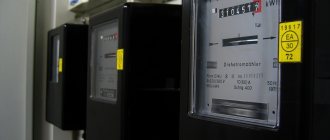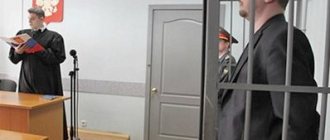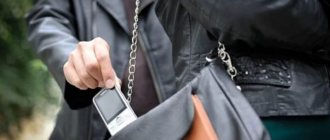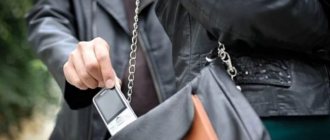Electrical energy plays a huge role in the life of modern man. Our entire daily life is tied to an uninterrupted supply of current. If there has been a deliberate power outage, it is important to check whether this action is legal or whether it represents negligence on the part of the electricity supplier.
Let's find out how to defend your rights in case of illegal shutdown.
When is it illegal to cut off the electricity supply?
Disconnection of the consumer from the power supply must be carried out in accordance with established laws and regulations.
However, situations arise when the supply of electricity is specially and illegally limited. What are these situations?
- Housing and communal services do not have the authority to turn off the supply of electrical energy if there is a debt for payment of any utility services, but there is no debt for electricity (how do electricity shutoffs occur for non-payment?).
- Let us turn to Article 38 of the Federal Law “On Electric Power Industry”. In accordance with this regulatory act, rolling restrictions on energy consumption are prohibited. This means that if there is a defaulter, then turning off his electricity should not infringe on the rights and legitimate interests of neighbors. In this case, an individual regime of restrictions must be introduced.
- On July 1 of each year, all constituent entities of the Russian Federation must establish a list of consumers in particular need of electrical energy. Blackouts can have social, environmental and economic consequences. For example, a sick person lives on the premises, whose life depends on the operation of devices connected to the network. Disabling an object can result in death.
- A shutdown is considered illegal if the procedure for introducing energy supply limitation modes is violated.
- Shutting down for scheduled repairs is considered illegal if it exceeds the permissible time frame.
- The electricity supply was not restored two days after the provision of a certificate stating that the debt for housing and communal services was repaid.
Disconnected without notice: can this be considered legal?
Even if a resident of an apartment building is in default on utility bills, before protecting him from receiving electrical energy, you need to notify him about this using any of the proposed methods.
The notice is delivered personally against signature or sent by registered mail with notification. Also, the non-payer must be notified by telephone call, notice on the receipt, email, etc.
20 days must pass from the date of the last notification, which are given to repay the debt. If the payment has not arrived, then a restriction on electricity consumption is introduced for a period of 10 days. Then the electricity will be turned off completely.
If the light was turned off without any notification, the citizen has the right to contact the Housing Inspectorate.
What is considered debt?
The law contains the concept of “incomplete payment for services”. They talk about it when the consumer has a debt of two months' rent (the average monthly fee is calculated from the consumption standard, installed meters do not affect it).
If the consumer pays for the services provided (this means all services: for example, one receipt may include a bill for heat and electricity) partially, then the amount received is distributed among all categories of services in proportion to the cost of each. The unpaid portion is counted as debt.
Once the amount owed exceeds two months' average payments, the utility provider may impose certain “sanctions,” including limiting the supply of electricity.
Liability for unjustified termination of power supply to individual apartments
Administrative
Administrative liability may arise in situations where the shutdown was carried out without following a legal procedure (what is the procedure for turning off electricity?).
- You can refer to Article 19.1 of the Code of Administrative Violations. The actions of the electricity supplier will be regarded as arbitrariness, and the punishment will be a fine in the amount of 100 to 300 rubles, and for officials from 300 to 500 rubles.
- If the lights are turned off very often, then you can resort to Article 7.23 of the Code of Administrative Offenses. For officials, the amount of the fine will be from 500 to 1,000 rubles, and for legal entities from 5,000 to 10,000 rubles. But only if it turns out that there is a real violation of the standards for providing the population with electrical energy.
- If the energy company is a monopolist in the energy market, then in this case Article 14.31 of the Code of Administrative Offenses can be applied. It indicates abuse of its dominant position in the market. Punishment for officials in the amount of 15,000 to 20,000 rubles, and for legal entities from 300,000 to 1 million rubles.
Criminal
- Very often, illegal power cuts can be calculated in accordance with Article 330 of the Criminal Code as arbitrariness. This means that the person who is responsible for the failure of power supply must be subject to a fine or correctional labor. Arrest and imprisonment are permitted.
- Also, in accordance with paragraph 1 of Article No. 215.1 of the Criminal Code of the Russian Federation, if a power outage resulted in any damage, for example, harm to health and so on, then in this case a fine, correctional labor, or even imprisonment will be imposed.
- If a power outage caused the death of a person, the official will be held accountable to the law in accordance with paragraph 2 of Article 215.1 of the Criminal Code. The punishment will be forced labor and a ban on holding certain positions.
Commentary to Art. 215.1 of the Criminal Code of the Russian Federation
Commentary edited by Esakova G.A.
1. The objective side is characterized by alternatively provided actions: a) stopping or b) limiting the supply of electricity or c) turning off other sources of life support. These actions must be illegal, i.e. be carried out in violation of the procedure established by law for the complete or partial deprivation of consumers’ access to electricity and other sources of life support.
2. The crime is considered completed from the moment of causing serious harm to human health, major damage (note to Article 216 of the Criminal Code) or other grave consequences (for example, disruption of the work of enterprises, institutions, organizations).
What to do if the lights in the apartment are turned off contrary to the law?
You should act in stages:
- File a claim with your electricity supplier.
- If the answer is negative or there is none, collect a package of documents and prepare a complaint to government agencies.
- Wait for the review result.
- If there is damage caused, a claim is filed in court.
Preliminary proceedings
Where to contact?
- First, the claim must be sent to the company that is the supplier of electrical energy. This is your management company, Energosbyt or HOA.
- If the appeal remains unanswered, you must send a complaint to Rospotrebnadzor, the prosecutor's office or the district administration.
- If damage occurs as a result of a power outage, try to hold the supplier accountable. To do this, you need to file a claim in the district court.
Required documents and evidence
If there is an illegal power outage, it is important to first determine which organization to contact.
- If you file a complaint, contact Rospotrebnadzor, the Housing Inspectorate or the prosecutor's office, in which case you will need to provide a response from the supplier to whom you previously filed a complaint.
- Receipts for payment of electricity and a document confirming the ownership of the residential premises are attached.
- Also, there may be other evidence, for example, written testimony from neighbors who also talk about illegal shutdowns.
Drawing up a complaint
The complaint is drawn up on a white A4 sheet.
- At the top, the initials and position of the employee of the prosecutor's office (Rospotrebnadzor) to whom the complaint is being filed are indicated.
- Below is the address of the location of the government agency.
- The initials of the applicant are indicated along with contact information. Residence and registration address.
- The date is set.
- In the middle is the name of the document.
- Complaints can be collective or sent by you personally.
- You must indicate where you live and whether you are the owner of the premises in which the lights are systematically turned off.
- The circumstances that preceded the power outage are indicated. Perhaps this is a violation of the supplier's duties or your failure to pay for services, but in the absence of notification from the supplier.
- We need to indicate that we pay for electricity every month, but the electricity supply service was still turned off.
- Information is provided when the lights were turned off, and how electricity suppliers responded to your request to turn them on.
- Also, there is a requirement to recalculate payments for electrical energy, as well as requirements for inclusion.
- Date and signature are added.
- The consumer consents to the processing of his personal data.
We do not recommend completing the documents yourself. Save time - contact our lawyers by phone:
8 (800) 350-14-90
Depending on the specifics of the individual situation, the text of the complaint may vary.
Terms of its consideration
In accordance with Federal Law No. 59 of May 2, 2006, applications from citizens must be considered within thirty days from the day your application was registered; this is stated in Article 12.
Trial
Statement of claim to court
The statement of claim is drawn up on a blank white sheet of A4 format.
- The right side indicates the name of the court where the case will be heard.
- Even lower is information about the plaintiff, indicating contact phone numbers and residential addresses.
- In the middle of the line indicate the word “Statement of Claim”.
- Below are the circumstances of the case with references to the legislation of the Russian Federation.
- It is established in which room the power was cut off and what reasons preceded it. Which is a direct violation of the rights, interests and legal requirements of the plaintiff.
- If necessary, indicate the status of the recorded readings of electrical energy meters.
- Requirements are established for the recalculation of electrical energy that was not consumed due to the shutdown, as well as a requirement for the inclusion of electrical energy.
- If damage has been caused, it also needs to be reported.
- Additionally, you can recover moral damages, lost profits, and so on.
- A list of attached documents is listed.
- Date and signature are added.
We do not recommend completing the documents yourself. Save time - contact our lawyers by phone:
8 (800) 350-14-90
Duration of the procedure
If the case is filed in the magistrate's court, then the statement of claim is considered before the expiration of the calendar month, Art. 154 of the Code of Civil Procedure of the Russian Federation, after which a date for the meeting is set.
State duty and other financial expenses
During the process, you may need the services of a lawyer. If the court finds the defendant guilty, this amount can be recovered from him.
The amount of the state duty depends on the price of the claim, this is regulated by Art. 333.19 Tax Code of the Russian Federation. If it is less than 20,000 rubles, then the amount of the state duty will be 4% of the amount, but not less than 400 rubles. If the cost is higher, the amount increases.
If the damage due to the blackout was not caused and the claims in the statement of claim are not of a property nature, then the amount of the state duty for individuals will be 300 rubles, and for organizations 600 rubles. in accordance with paragraph 1 of Article 333.19 of the Tax Code.
There are many reasons for a power outage: power failures, scheduled repairs, debts to pay for electricity. Every situation has its limitations. Where to go in case of frequent interruptions, how the owner can refuse power supply, and whether the chairman of SNT or the management company has the right to stop the supply of electricity - read our materials.










